Caitlin Homes | Body Composition for Climbers
Certified Nutrition Specialist and co-host of The Average Climber Podcast, Caitlin Holmes, sits down with Kris to discuss body composition, which is often conflated with weight loss and can thus be a very polarizing topic.
Caitlin breaks down what body composition really is – and isn’t – and how we as athletes may need to think differently about health and nutrition suggestions than the general public.
DISCUSSED IN THIS EPISODE:
What body composition is, and how improving it doesn’t always involve weight loss.
The long-term and short-term risks of being undernourished as an athlete.
What BMI really stands for, and why we should throw it out the window.
Why bodyweight really isn’t a metric for climbing performance.
CHECK OUT CAITLIN’S NEW COURSE:
BODY COMP PRO
Body Comp Pro is a 4-week self-guided course for active individuals who want to learn how to change their body composition.
This course will help you master your understanding of what really impacts body composition and the what, the why, and the how when it comes to body composition changes. By investing in this course, here's what you'll receive:
An understanding of the diet and lifestyle factors you should consider when seeking body composition changes.
The tools you need to estimate your energy and macronutrient intake.
Knowledge of when to prioritize changes to body composition including weight loss and muscle gain.
How to pursue safe and effective changes to your body composition.
Save $50 by enrolling before December 16th and receive immediate access to the Body Comp Pro Masterclass. No coupon needed - discount already applied!
Full course becomes available January 9th, 2023.
FULL EPISODE TRANSCRIPT:
Kris Hampton 00:00
The Power Company Podcast is supported by our Patrons. They keep this thing sponsor-free, and in return, they get two bonus episodes every month. For as little as $3 per month, you can, too. patreon.com/powercompanypodcast or click the link right there in your pocket supercomputers. Thanks.
Caitlin Holmes 00:26
Maybe you're a month before, deciding now is my time to go all-in on training, cutting out certain foods to improve body composition. That is honestly a combination recipe for absolute disaster.
Kris Hampton 00:57
What's up, everybody? I'm your host, Kris Hampton. Welcome to the Power Company Podcast brought to you by powercompanyclimbing.com. It is damn near Christmas. And you are procrastinating. Yes, you. Me, too. I know how it goes. But we have a big sale going, some items up to 50% off. And if you want it delivered to your door in time to put it under that special somebody's Christmas tree, or your own because gifting yourself is always a good thing to do, then you're gonna have to get in there ASAP, and get your order in, or we just won't have time to get it there. Our Ebook training plans are also on sale, which happens less than once a year and are delivered instantly. So if you're that person in the mall on Christmas Eve, we got you. Alright. Today's guest is Caitlin Holmes, who you've heard on "The Average Climber Podcast" where she is a co-host, on the fellow Plug Tone podcast "The Struggle Climbing Show" where she was one of the expert analysts from season one, and right here on our recent first annual Average Climber Board Meeting. Caitlin and I got together to talk about body composition, a subject that's often cast in this polarizing light anywhere you see it on the social media interwebs, which, frankly, has become my least favorite source of information. So far down the list actually, that I can't even call it information anymore. Maybe disinformation, like last week's guest Steven Jeffery called it, is the more appropriate term. Anyway, Caitlin is a certified nutrition specialist with a Master's in human nutrition and functional medicine, and is also a climber. So she understands not only the needs of the sport, but also the insecurities and misunderstandings that come along with it. Let's get into it.
Kris Hampton 02:58
Before we even really get started into this conversation, I want to clarify here that a lot of what we're talking about is sort of performance related. You know, we aren't saying that you can't be a climber if you don't, don't have a certain body type or a certain body composition. You can be a climber without giving a single damn about how hard you climb. Absolutely. That's not what we're saying.
Caitlin Holmes 03:24
Totally. Absolutely.
Kris Hampton 03:26
But if you're considering what you can do to improve your performance, then this conversation may help clarify things, it might give you some direction.
Caitlin Holmes 03:39
Absolutely. And I feel like it's important to note, too, that body composition maybe isn't appropriate for everybody, like you said, Kris, but it's, I think we're hopefully going to talk about just maybe some more of the nuance with body composition, so...
Kris Hampton 03:55
Well, I'm leaning on you heavily for this because I, I'm coming into this without a lot of knowledge of what's healthy, what isn't, what we should be considering, what we shouldn't, simply because it's – that's not been my experience. You know, I have not tried to regulate my weight in order to climb better. It's just not a thing I've been concerned about ever. I mean, I've, you know, I'll like, "I'm going to eat more spinach for the next three months,"
Caitlin Holmes 04:34
Gonna Popeye it.
Kris Hampton 04:35
I'm going to continue eating my gummy bears and all of the other things but I'll eat a little more vegetables. And I'll lose three or four pounds and I send and I'm right back to normal. You know that, that's sort of been my experience so I don't know a ton about this. I think it's a topic that can get really contentious. And can be, you know, a sort of flashpoint for some folks, so I want to be careful of that.
Caitlin Holmes 05:07
Right. I mean, it's heavily polarizing, really, like, I mean, you're either all the way on one side, where it's like, no, you know, no body composition! Or... I guess when people hear the word 'body comp', they think 'weight loss'. That's the automatic thing that I used to feel, like, you know, when you hear that, that phrasing, "Oh, weight loss? Absolutely." And I feel like that topic in and of itself is really, really polarizing, because you have people who are on one side of that, who are saying, "Okay, weight loss is good, it's helpful for performance." And then you have people who are on the complete opposite side of the spectrum saying like, "Absolutely not. You know, that's, that's not the strategy." And I think that, before you really understand if, you know, something's gonna work for you, you kind of have to understand even what body composition just is at the baseline beyond weight loss.
Kris Hampton 06:04
Yeah, totally. And I think, especially when we're getting all of our information on the internet, more and more toward like, getting our information via Instagram reels, where you you learn everything about a subject in 60 seconds – go! You know, that that seems to be the way everyone is taking in information these days. And that leads to this like polarizing way of learning, which you were just alluding to. Can you tell us what body composition is? Like what is it we should be considering, thinking about, when we say or hear 'body composition'?
Caitlin Holmes 06:45
Yeah, absolutely. So body composition is basically, well, I'll say this, it's, it's really not about restriction. And it's not exclusively about weight loss. So when we are talking about what body composition actually is, we're talking about our lean body mass, or our muscle, our fat mass, or adipose tissue, we're talking about our skeletal structure, and maybe water as well. So it's not just about the, you know, the fat mass that you have on your body, which is a critical part of our health and wellness. And for athletes, I think that we tend to think more about the side of, "Well, okay, well, how can I improve my body comp? How can I lose fat?" When in actuality, body composition might be more about increasing muscle mass, and either fat will stay the same, maybe it'll decrease, or maybe it'll increase. So a lot of people might actually gain weight when trying to improve body composition. It's, it's really hard to just flat out say, "Okay, body comp improvement is weight loss," because that's really not what's happening for a lot of athletes out there. And I think when people get into body composition, if they start to gain weight, they're like, "Oh, my God, what am I doing?" And that's when you start potentially restricting calories, restricting different foods, and then you kind of go down this maybe slippery slope of what I would definitely not recommend for body composition. It gets a bit tricky.
Kris Hampton 08:20
Totally. And, you know, like you're saying, and I think this, this is, what you're saying is that we have to kind of look at the whole pie here. It's not like, oh, we're just talking body fat percentage when we say body composition. We're looking at the entire thing and the ratio of what makes it up, you know, what this thing is, the whole picture.
Caitlin Holmes 08:45
Absolutely. And I mean, weight is so not a helpful metric. It's just, it's, it's hard to talk about because I think, you know, people start training, and some people may lose weight during a performance season just by nature of increasing their energy output, even if they're, you know, if their calories stay the same, or if they go up, but I think so much of what when we get into a training season, what we might sometimes fear is actually gaining weight when really, you know, if you're training, you're building adaptations. Don't you want to build muscle? And maybe that, that comes with some weight retention from or water retention from just, you know, the inflammation in your muscles. I mean, that's, I think that gets lost in the maybe the 60 second Instagram reel thing.
Kris Hampton 09:41
Totally, I mean, strength and power, whether we like it or not, are related to muscle size, you know. It's not a one to one relation. It's not like you know, for every centimeter I put on my bicep I'm going to get this much stronger, but they are related. So an increase in lean body mass will likely enable us to generate more force in a specific period of time, making us potentially better athletes. Now, that's not saying, you know, I did not say there 'decreasing body fat percentage'. Along with increasing that lean body mass, like you said, that might mean our body fat percentage goes up a little or, you know... our body composition is going to change. But that doesn't mean reduced body fat, necessarily.
Caitlin Holmes 10:36
Absolutely. And what's interesting too, about, you know, if we're using weight as our metric, there's so many things that go into play there that could be affecting why we have body weight fluctuations, you know. It doesn't necessarily indicate fat mass gain, either. It could be hormone fluctuations, it could be maybe you had a really salty meal the day before, maybe you had a couple of beers, or a couple of alcoholic drinks, maybe you're recovering from training, or you haven't had a bowel movement for the day, or, you know, the time of day that you're weighing yourself. So I just, it's amazing to to hear, you know, when I work with people, they'll say, "I'm actually gaining weight, I'm a bit confused," and we go, "Okay, well, what are some things that are changing, what could be happening?" Is weight gain that detrimental to your performance, that even if you're improving your power and your strength, you're, you're still scared to put on that weight? I think it really is something that we we fear.
Kris Hampton 11:41
Yeah, you know, as a, as a coach, who is, you know, we use a lot of metrics in our coaching. And one of the things we've had to be really careful of is that athletes will tend to latch on to the metrics, you know. They're, they're easy to measure, you know, I can stand on a scale and get my weight. And then I have this objective measurement of me right now. You know, that's how it feels to a lot of folks. And those metrics are just not necessarily an indicator of your performance. The, the formula is much more complicated than that. There, there is no formula, you know, essentially. And we lose track of the one metric that, for a lot of people makes, is the defining metric, which is: are you performing better or not? And, and oftentimes, we'll latch on to that metric and take that metric to its extreme. And maybe it helped your performance here and there, but then you don't know the other side of it. If you, if you didn't pay attention to that metric, or if you took that metric in the other direction, could that still help your performance? You don't really know. Because the metric you're focused on is this: how strong are my fingers? Or, you know, what's my body fat percentage? Or what's my weight? And those aren't the metrics that necessarily matter.
Caitlin Holmes 13:11
Yeah, I think we get so caught up in it, too. And it's, it's talked about so or it's emphasized so much, in at least the community that I'm around, and the community that I've climbed around for most of my, my time as a climber. And even just this past weekend, I was out at a crag here in Santa Fe, and I overheard a conversation between two climbers and they were just saying, "Oh, well, now that I'm emphasizing nutrition, and I'm really focusing up, I'm actually climbing worse, and I'm more injured." And I'm like, "Well, maybe you aren't eating enough now. Maybe your idea of paying attention is just restricting or cutting out really important nutrients, and that's causing your injuries." So I think we just, we have this assumption of what either others have done and then we want to emulate it. Or maybe it's just, you know, we think we know, "Okay, well if I cut some body fat while I'm training," which, by the way, is like the worst time you could ever cut body fat ever. It's just, it's not going to be a performance enhancer. It's going to be an inhibitor, just bottom line.
Kris Hampton 14:27
Yeah, I do think people and I just, you know, I just misspoke essentially, as well. And I think people end up in this trap that I just got myself into where I said, you know, 'you're paying attention to this body weight metric, and maybe it helps your performance here and there.' What I should have said is 'maybe your performance goes up.' You don't know if your weight had anything to do with it. You're just making this assumption, you're tying it to that. Just like this person you're overhearing at the crag is saying, "Oh, now I'm paying attention to nutrition, the like, black or white model of it that I learned on this Instagram reel, and now my performance is declining." You know?
Caitlin Holmes 15:15
Right, it's like what came first?
Kris Hampton 15:17
This is all an experiment, right? So if your experiment is not going the way you want it to, change your experiment a little bit, maybe learn some more things about nutrition and see if that helps. This like one time experiment of, "I tried the thing, it didn't work, done. That's it." You know, that's not the way it goes.
Caitlin Holmes 15:39
Yeah, it's like, you kind of have to continue evolving with it, meet yourself where you are today. You know, say, for example, I had a client who was at the, you know, they were preparing for a big competition. And they were also trying to specifically fine tune their nutrition for their training. We were experimenting with, I mean, they were they were doing a lot of things, not only climbing at an elite level, but they were also training for Muay Thai. And they just were like, you know, "I'm burning both ends of the candle. And I don't ever have enough energy in either sport." And we were trying to experiment with a couple nutrition things. And they were just like, "Oh, you know what, it's, you know, something's just not working. It's like, I think my, you know, my training for some reason isn't dialed in. Or maybe I should work on body fat losses." And I'm like, "No, I think you're just doing too much. Your nutrition, maybe the experiment we were doing just isn't the right balance, maybe we need to make some changes." So that's, I think people get so stuck in that, "Okay, this is the one thing I'm gonna do. And that's it," when in reality, it probably fluctuates. And probably each season is going to be different, too. You know, why, why would it be the same every single year and not have a new challenge? I mean, your life is constantly changing. It's not so linear.
Kris Hampton 17:08
Totally. You just brought up something I hadn't really thought much about before. But, you know, I hear clients come to me all the time that are like, "I've got a trip in three weeks. I'm ready to train. How do I know prepare?" And I'm like, "Too late. Sorry."
Caitlin Holmes 17:27
Hop and a time machine, go back three months, then let's talk.
Kris Hampton 17:32
Yes. And, and I think, you know, that must be the method that a lot of people default to with nutrition, as well. I'm certainly guilty, in the very rare occurrence that I'm paying attention to what I'm eating beyond it just being a lifestyle habit, for me, it's like, "Okay, I want to send in two weeks, eat more salads," you know? And that's not necessarily the best method. Because here I am trying to send a thing, and now I'm restricting my calories. I think it's better to experiment, weigh out, learn what works for you. So that in the moment, you know, in the two weeks leading up to the performance, you can stop experimenting, and go straight to what you know works.
Caitlin Holmes 18:33
Absolutely. And even if we're talking about body composition here, if you are, you know, say... okay, the season in the Red is gearing up for a lot of people. If you're the month before, two weeks before, deciding "Okay, now is my time to focus up," and you go all in on training, start cutting out certain foods, maybe you're you're trying to dial in so you can improve body composition, that is honestly a combination recipe for absolute disaster. And then you get into the season, if you feel like you're not performing well or maybe, you know, worst case, you get injured. And you're like, "Oh, I, you know, I suck. It's my personal issue." It becomes this like, moral problem where you're like, something you did is so horribly wrong, and you're a bad climber. When in actuality it's just, the beta around what you chose to do beforehand maybe wasn't the way to do it. So I agree, you know, going back months before your specific season starts, you know, thinking about the goals that you might have and understanding "Okay, well, what do I actually want to do? What's my training going to look like? What's my life gonna look like? Both personally, maybe professionally? And how can I, how can I make adjustments now and experiment for what that time might become?" So it's kind of like what you said, Kris, you know, not cutting out your favorite foods, like I'm not cutting out donuts before season. I'm increasing them. That's very important.
Kris Hampton 20:14
This is the content we all need.
Caitlin Holmes 20:17
More donuts! Yeah, it's just bizarre to me that... I mean, I understand why, why we do what we do – we're so passionate about our sport, we want to go all in – but I think people get it wrong, where they're like, "Okay, time to suffer. I'm gonna sufferfest, type two fun for my nutrition." Like, Why? Why do you have to suffer to succeed? I mean, it's not always like that.
Kris Hampton 20:43
Yeah, and I think, you know, weight loss isn't going to be a performance enhancer for everybody. For some folks, it might be. But it can inhibit your performance, it can make things worse, we've seen that happen with a lot of athletes across the board, not just climbers. And the way to know that is to experiment a little well ahead of the performance time, you know. Olympic athletes aren't showing up at the Olympics and being like, "Let's try some new diet fads."
Caitlin Holmes 21:20
Definitely not. Yeah, I think, well, to get, to kind of add on to your experimentation thought there, the way that I like to look at this is, if you want to track fluctuations, something that I've started doing – because I have a history of an eating disorder, disordered eating, and that's something that I've had to process. When I started climbing, it sort of reactivated itself. I'm from the ballet world. So it just, you know, different, different sport, but very similar conversations about bodyweight. And something that I've discovered works really well for me and some of my clients as well who have a similar experience as I do, if it's comfortable for you, and if you feel like you're interested to look at weight from maybe an approach that's less tied to the aesthetic or a performance, you know, enhancer, or, you know, whatever the I guess, "ideal body weight stuff," – like if we throw that out the window and we look at it more from an analytical point of view – if you want to track these fluctuations, the way that I like to do this is to weigh myself the same time of day, every day, for a week only. And then keep this as a log too and understand, "Okay, I trained this day, or I had maybe a really salty meal, or maybe I had a couple of drinks." Or maybe you know, my, maybe I had a, I don't know, really good bowel movement, for example. And I'll track that every single day, keep it as a log, and it helps me bring some awareness to how much the weight fluctuates. And I mean, I've seen fluctuations all the way up to eight pounds in a couple of days, and then it goes back down. But that could be a really good way to to just see and understand, "Okay, my weight does fluctuate." And it, I think it could be something that if, if you're curious and you want to understand that how that changes, maybe that's a first step to seeing, "Okay, do I want to make some body weight changes at some point?" But maybe this is a good way to bring some, some nuance to it, because there's really no benefit to daily weighing. And I just think that creates a lot of stress around body weight as well.
Kris Hampton 23:56
Totally. I mean, you know, if if I'm in a town where there's a Chipotle, then I can, I can fluctuate five pounds in 30 minutes.
Caitlin Holmes 24:05
Absolutely. Yeah. A burrito the size of a baby, definitely it just sits there.
Kris Hampton 24:14
Yeah, you know, it's funny, I I've considered multiple times throughout my like, climbing and blogging and podcasting career of like, tracking my weight and taking, like, daily photos of how my body is changing throughout – changing or not changing throughout – a training cycle. Or, you know, as I'm getting older or whatever, and I just don't have the discipline to do that...
Caitlin Holmes 24:48
Plus, you don't care, right? It's like, yeah.
Kris Hampton 24:50
...to constantly weigh myself and to take those photos. So what'll happen is, you know, like the first three days I'll weigh myself at the same time, and then the next day I'll forget and I'll weigh myself at a different time of day, and it's a wild difference. And I'm like, "Okay, fuck it, nevermind."
Caitlin Holmes 25:08
Nevermind, not helpful. It is interesting. I mean, it's, for a lot of people, I think, just tying so much worth to something that is so arbitrary as bodyweight. And it's not to say that if you've tried weight loss, or if that's something that's worked well for you that that's not valid. It's not saying that, it's just saying, I think we heavily emphasize it to a fault where, like... I'll give myself as an example. When I first started climbing, I essentially broke my ankle really early on in that, that timeframe. And I started training really heavily. And I cut a lot of weight just because I wasn't, you know, lifting heavy leg workouts anymore. And I just ended up dropping weight by nature of that. And when I came back to climbing, I was crushing it. I mean, just I flew up three grades in bouldering. And I was like, "Oh, it's because I lost weight." Nevermind my, you know, heavy hangboarding routine, right? That was something I had never done and then started doing, that was probably most of it. But because I had that weight loss, I, for the next two or three years, used that as a heavy emphasis. And at some point, I plateaued so dramatically. And I was, I was back down three grades, I couldn't put on muscle, I felt tired, I wasn't even having fun. And it wasn't until I started to put on weight again, and heal my relationship to food – that was something I had to do, I hadn't ever really worked on that before. But I finally sought out additional help. I, you know, I was also in grad school for nutrition, so that kind of helped, I think, give me some healing, so to speak, and some additional recovery. But I put on quite a bit of weight, I started training again, I really was enjoying climbing again for the first time in a few years after just getting shut down on so many projects. And I, I was sending things that I couldn't send at a lower body weight at this much higher body weight that, you know, it was body fat, muscle, it was a combination of things. But it just goes to show you that even if you lose weight for one project, you're not guaranteed to send all your projects. And that method may not work for you year after year. Because, again, it's really hard to just say, "Okay, is it the weight loss? Or is it something else you were doing? And will that work again? I don't know."
Kris Hampton 27:55
Yeah, and it's just not a sustainable thing, right? I mean, eventually your energy's going to, your energy availability is going to go down, that's going to result in you training less. You know, you're going to have fewer good attempts when you're at the crag, and that's going to result in projects taking longer. And, you know, it's just gonna be this cycle that's really hard to break out of unless you start looking at what are the, the roots here of what I'm doing, one of which is your caloric intake, and, you know, how your, what your relationship is with food.
Caitlin Holmes 28:37
Right. Yeah, you know, we can't, can't expect the restriction to be a tool that works long term. I mean, even in the short term, I've seen it time and time again with my athletes. They, maybe if they have a couple of days where they've either accidentally restricted or, you know, if life was just busy and that's how it worked out, or if they, even if it was intentional, you know, and we're working on that; they could see some performance losses, if they just go to the gym, they don't have that energy output to give it their all, they really can't give as many burns on their either outside projects or inside, but they feel like even on the hikes to the crags, they're, you know, totally winded and just gassed by the time they even get there. And I do think it is so important to emphasize, too, it's just like, you know, getting the baseline nutrition that you do need and making sure that you, you're hitting that amount of calories that you need to sustain just energy, will help prevent both short-term and long-term complications, which really could just, I mean, the long term restrictions are really unhelpful for performance, but also because you may open yourself up for injury risk. You may have bone issues, potentially mental health concerns, digestion problems, lots of sleep issues, certainly hormonal disruption, as well, you know, amenorrhea for people who menstruate, that could become a big concern, too. And it's just there's a lot of things at play there. And over time, it's, there could be more detrimental things to your performance. And overall, it would be a massive performance inhibitor, if that's your main goal of, in doing that.
Kris Hampton 30:33
Totally. You know, it, I think there's some real danger in the mindset that I've been in myself of, "Oh, I can drop a little weight for this big send." Because increasingly, more and more people are like, "I perform all the time, I can climb year round, I'm traveling from area to area when the good seasons are hitting," and, and it's year round performance now. And that becomes year-round drop weight, drop weight, drop weight, drop weight.
Caitlin Holmes 31:07
Just chronic.
Kris Hampton 31:08
And yeah, that can be a really detrimental thing for someone's health. And I think the intersection here between performance and health is a really interesting one that I'd love to talk a little about. Because they don't always overlap. Performance can look very unhealthy sometimes. And I don't think that's necessarily a bad thing, if you have some level of control over over that, you know, mentally, yourself. But I do think there's some overlap there that you were just alluding to, that there's a whole host of problems that if you don't stay relatively close to where that Venn Diagram of performance and health overlaps, that you could slip away from, and that's going to cause your performance to go down.
Caitlin Holmes 32:03
Absolutely. And sort of an example that comes to mind here that I like to use, because I think with athletes for some reason there's, it's, there's a lot of abstractness, but also there's, like... I'll give another example. You know in mainstream health and wellness conversations, if you were to ask someone, "Okay, well, what, what's maybe not great for heart health?" they'd probably say, "Okay, well, you know, high blood pressure, for example, or cholesterol, you want to watch your salt intake, you want to watch your fat intake, and maybe that's red meat, as well." But those are things that are for the general public, not necessarily for athletes. And I think we have all of these assumptions that we've heard over the years that we're like, "Right, this is the blueprint for health," when in actuality, it doesn't apply to us. Because you can truly, you could be someone who is really, you know, lean, lower body fat percentage, and maybe you really don't eat much every day. Maybe, if you, I don't know, maybe you smoke a bunch of cigarettes, or you drink a bunch of alcohol, but you look the part. You probably aren't going to be crushing it too hard and you may actually have a lot of performance inhibitors over time, especially you would certainly see bone loss, more risk of I mean, osteoporosis, and that's something I think a lot of younger climbers are like, "Oh, yeah, that's maybe not something I'm thinking of right now." But certainly in the short term, you know, within months of just restricting, that could open you up to lots of injury, whether it be to bones, or you know, connective tissue, soft tissues, you could have more strains than normal, you could also just be mentally gassed and go into things a little bit foggy, make silly mistakes, or, you know, injure yourself in that way. Or maybe you're just a bit lightheaded when you're, you're walking into places, maybe that leads you to sillier mistakes, too. And limits your safety. But also maybe, you know, you're not sleeping now. And so then you have that massive performance inhibitor, too. And your body doesn't have that time to recover, and it starts to tax you mentally and emotionally, too. And then, you know, the flip side of that, you could be at a higher body fat percentage, maybe you're, you know, you're training, but you're building muscle slowly, and maybe you're doing really well and it's like the long game at that point, right? So it's like, how much are we willing to put into something emotionally in the short term versus how long do we want to actually climb and enjoy the sport that we do love? It's, you know, it's like, do we go balls to the wall all the time. I don't know if I want to do that anymore.
Kris Hampton 35:04
Yeah, I can't do that. No, just, I just can't sustain that. There are other things in life I want to do and want to enjoy. And trying to sustain going hard all the time, I mean, even just for a season, it's, it's really taxing. So yeah, considering traveling from area to area, season to season, and doing that year round, year after year? No fucking way.
Caitlin Holmes 35:34
No way. Well, you see all these like, I mean, I'm sure you know, many crusty climbers from you know, back in the day, but they're all broken. They all have these...
Kris Hampton 35:47
And bitter.
Caitlin Holmes 35:48
Bitter and broken. Yeah, that seems to be the the crust formula. And I mean, their knuckles are enormous. They're grouchy all the time. And I think it just really goes to show it's, you know, years of just battling through a lot of dicey situations in old school climbing, but also the rhetoric around body weight and performance and just, you know, like, "Suffer, keep suffering, and give it your all, no excuses." It's like, well, okay, maybe there's some, sometimes there's a time and a place for that excuse. And I personally would love to be able to climb all day every day and keep the stoke alive year round. But that's just, that's not who I am. And I think a lot of people feel shame and guilt for also feeling that way. And they're like, "Well, okay, but I kind of need a break, I'm a little bit tired." And maybe if you start realizing you have that, that mindset coming in, take a break, don't just keep going. Because I feel like that's where injuries really start to appear. And maybe when people take it too far with body weight, maybe they take it too far with body fat, because I mean, body fat really is essential. We do need it for so many things. Fat is such an essential part of life. And when we don't have it, it can actually really harm us healthwise, but performance? Absolutely.
Kris Hampton 37:16
Are there specific measurements that are better than others, to determine your body composition? You know, I know things have been floated around for a number of years. BMI was really popular 20 years ago, or something, maybe even more recently, I really have no idea. But what are the the good measurements? And what are the ones we should maybe avoid?
Caitlin Holmes 37:45
Yeah, I will, I'll start, just because you said BMI, I'll start with that. It is a garbage way to measure the ideal body weight. It's just, bottom line: it's not a supportive or representative tool for most of the public. It's, I mean, when BMI came about it was heavily based on you know, Eurocentric white bodies, Caucasians, and that's just obviously not helpful or representative of a lot of climbers out there. So BMI, throw it out the door, don't even look at it. It's just not helpful. And I think too, it's still predominantly in a lot of the climbing spaces. So I definitely think that if you see a BMI that's higher... oh, I'll give a quick example: the Rock, right? Massive dude, just enormous. His BMI is through the roof. But when you look at him, you're not like, "Oh, he's obese or overweight," like, obviously, right? So that's my example.
Kris Hampton 38:57
Yeah, I've seen a few studies with like, you know, NFL linebackers, right? They're, like, ridiculously fit. They, they're super fast. They're super powerful. They're super strong, but their BMI is absurd.
Caitlin Holmes 39:13
Right, right. So like, why are we still using this? Like, again, it comes back to okay, athletes, there's no nuance in mainstream nutrition for you. So you kind of have to pick through like, "Okay, yeah, that, that applies to me," or "Oh, no, actually, that doesn't apply to me." So it is hard, I think, because we're constantly thrown so many different opinions and evidence. And it's like: Who's telling it to you? Where's it coming from? What's the research we're using? There's just so much ingrained there that I mean, we could unpack that for a whole other episode.
Kris Hampton 39:50
Sure. So we just assume that BMI is, let's just say that it now stands for Bad Measurement Inherently. That's what BMI stands for, and just throw it out the window.
Caitlin Holmes 40:02
Absolutely. Let's ditch it. But there are, there are actually three really great ways to measure body fat. And I think you know, we, if you look up, let's say calculations, I'll give a quick example, too, of maybe one more bad one: so in grad school, in my sports nutrition and exercise metabolism class, we were instructed to pick one of the many calculations for body fat percentage and see where we were at. The one that I chose measured my forearm, and it, the number that I got was outrageous. And I was like, "That can't be right." But you think about okay, climbing forearms, obviously, it's different. So I do think that...
Kris Hampton 40:50
I might look like a sumo wrestler by my forearm measurement.
Caitlin Holmes 40:54
Right. And it's, it's just so not correct. It's, it's, it's shocking, actually. So throw the calculations out the door, too. But if you are looking for, let's say, there are three actually that I think are great calculations, measurements of body fat percentage, I should say. And really the the gold standard that is available to some people, this is more of a based in labs, or like university settings, so it's a bit harder to come by. But that's underwater weighing, that's going to be the most accurate just because it does measure density. But because people don't really have access to that, the next available tool will be something like a DEXA, or InBody. And I've actually seen a few gyms have InBody available, it's usually pretty inexpensive to have both of those run, because it's sort of similar to underwater weighing, but a little bit different. But those two would be largely available, too. And DEXA scans are actually really helpful for measuring bone density as well. So if you're curious about that, or concerned at all, that could be a good tool to measure that. And those I would say, are like the next best. And if you're looking for something that's the most inexpensive, that would be skin calipers. And I feel like a lot of people know about that, where you measure different, it's like seven points on the body, mostly in the trunk and on the limbs. You measure through these little skin pinchers, basically, but this one is prone to user error, you really should only have a trained professional do this, just because I think there can be a lot of incorrect measurements done there. But really, with any of these tools, there's probably some amount of, you know, standard error, there's going to be some inaccuracies there. And I know too, I've had a couple of athletes say, "Okay, I just had a DEXA scan done. This is what it said my body fat was," and we talked about it in terms of like, "Okay, well, what's your thought, either good or bad? Neutral? You know? What, what would you like to do with this information?" And a lot of the times, they're surprised that it's lower than they may have thought. But if it is higher – I want to at least share the word of caution – you know, if it's higher than you expect, it doesn't mean that all of a sudden, you know, the next time you go to the gym, you're going to do poorly. It's like, you know, you've been doing the things that you've been doing, and there's always going to be somewhere that you can make changes. And maybe it's not even body composition, maybe it's the aspects of holistic health, the foundations of your health and wellness related to body composition, certainly. But maybe it's it's like the essence of it, versus, you know, having that be the root of your "problem". I don't think that's the case.
Kris Hampton 44:02
I'm curious, when when people are getting these measurements, whether it's DEXA scan, or skinfold thickness or whatever. Do you find that they come in with some sort of expectation and then almost immediately feel like they did poorly on this test? And I ask this, because that's what happened to us, when we first started getting measurements of people's, you know, like, finger strength or pull up strength or things like that, is they would get these measurements and their response to me would be "I did really horribly on that." And I'm like, "What do you mean? Like, this is just a measurement. This is just, I don't know what horribly means? So how do you?" you know.
Caitlin Holmes 44:50
Yeah, like what's, what's your metric of horrible? So you feel like people when they, I mean, have you ever really heard somebody say like, "Oh, I did so great on those assessments."? Has that ever really happened?
Kris Hampton 45:01
No.
Caitlin Holmes 45:01
Oh, no, that's awful. You're like, "It's just a test!"
Kris Hampton 45:06
We changed our wording entirely, the language that we used around it, because when we called it a test, people thought they failed across the board.
Caitlin Holmes 45:16
Wow, that's so interesting.
Kris Hampton 45:18
Since we've called them just 'measurements', and we've avoided the word 'test', I think it's gotten better. But I'm just curious with people like getting these numbers, is there some reaction to the numbers that maybe doesn't match reality?
Caitlin Holmes 45:35
I would say there's, there's likely always going to be some unmatched reality, whether it be like, okay, I had one client, who they, you know, they had a DEXA scan done, and their body fat was quite a bit lower than where they thought they were. And they were just confused afterwards, you know, they were like, "Okay, well, it's just probably not correct. Like, I need to go back and get it done again, because that number is not correct." I was like, "Well, hold on. So if it validated your expectation of being higher body fat, you'd be okay with that, versus, you know, it's saying you're a bit lower, and you're actually quite a bit closer to your goal than you thought." So, in essence, he thought he still failed, because he was close to it. And then I've had other instances to where certainly, they get this number back, and maybe they've been crushing it in the gym, they've been, you know, they've gone up two V grades, or they just sent their outdoor project, they're really doing well. And then just for fun, they go and get a DEXA scan or and InBody. And they come back to me and they say, "Oh, my body fat's actually high," you know, 'high'. And they they decide, "Okay, well, I actually want to change it because it's impacting my performance." And then I'm like, "Well, no, is it though? Because you just told me you sent." And they go, "Oh, well, yeah, but..." And then it's it becomes this spiral of the runaround of like, "Okay, well, I'm assuming my weight is, it needs to be changed." And I'm sure there's some level of failure there with a test like that. Yeah, for whatever reason.
Kris Hampton 47:27
Yeah, that's, that's really interesting, I see the exact same thing with people measuring their, like, physical characteristics. And, um, you know, we put out these charts that are like, "Here's the window of what we expect to see when you're climbing V7", "This is how much weight you should be able to hang on a 20 millimeter edge with...", you know, we put out these charts. I'm always really hesitant to put those things out. Because when people don't fall within that window, they get really nervous and they start focusing on that thing. Is there, is there a percentage we can point to, for athletes, that's like, you should be within this window for a healthy body fat percentage? And, you know, is it different for healthy versus performance, when you're an athlete? Are there guidelines, I guess?
Caitlin Holmes 48:22
Yeah, there actually are. And I'll give, I'll give the range that I think is probably the most health-full, still health-promoting for athletes. And it is a bit binary, so I do apologize for that. But for men, this could be anywhere from 6%-24% body fat, and again...
Kris Hampton 48:44
Hmmm, so a big window.
Caitlin Holmes 48:45
Yeah, huge window. And this depends on body type, muscle mass... I mean, you could have lots of muscle with also, you know, maybe higher body fat percentage, doesn't mean it's a detriment to you in terms of performance. It could also just be your genetics, maybe you have higher body fat percentage, and that goes up with muscle. Super hard to say, for sure.
Kris Hampton 49:10
Are you Dwayne Johnson?
Caitlin Holmes 49:11
Yeah, exactly. Are you actually a rock in physical form? So it just, it wildly varies. So it's not to say that, you know, at 6%, you're going to have the most optimal body fat. Again, it really depends on the type of athlete you are, in terms of: what are your goals? Are you an endurance athlete? Are you, are you strength and power based? Are you a combination of those? Genetics, certainly, body types, there's just so much at play there. And then for women, the range is equally varied, though it's a bit of a tighter window, and I'll explain why. But there's, about 14%-31% body fat is deemed still healthful for women. And especially, it's interesting for women, there's a lot of discussion around performance enhancement, especially lower on this body fat percentage range. But what's super, super important to note here is that being closer to 20% body fat or higher is actually going to be reproductively the most healthful. So this is the range when most individuals are still experiencing menstrual health, you know, they haven't lost a period, haven't started to lose, you know, that cycle. Because when, it's not to say everybody has this, but when a person who menstruates loses that cycle, that's when it's sometimes a good indicator that maybe it's gone a bit too far. And that could look different. For some people, maybe that happens at 18% body fat, maybe that happens at 22% body fat, you know, so still within that range, that's 'healthy', but each individual is going to be very different. And if cycle is lost, this would be a good time to potentially increase energy intake, just because it may show up as lots of bone health issues, you know, bone deterioration, and could be mental health concerns, as well. It could be again, the digestion, the sleep, and that, I guess, brings us to, you know, RED-S, the female athlete triad, like, you know, some some bigger issues within the athletic community that I know has been talked about more and more, but we really don't want to get too low body fat. Whoever you are, again, it could vary what your healthy body fat percentage is, but going too low can dramatically impair health, performance, maybe even body composition as well, you know. That, certainly, I noticed that, too. I, when I was too low body weight, I started to notice that my body held on to fat in areas where I was kind of confused about, but I just, I don't know. I looked like my muscles were sinewy, if that makes sense, like it just, it just wasn't what I was hoping for. So low body fat also is just, again, it can be very subjective, it doesn't necessarily mean that the lower you are in body fat, the healthier you are, it could actually be the opposite. Just like the higher you are, could be, you know, healthier for some and not for others. So it does wildly or dramatically, vary wildly.
Kris Hampton 52:46
Sure. You know, Paul, and I recently recorded an episode for Breaking Beta, I think it will end up being episode seven of season two of Breaking Beta. It was looking at a 2020 paper about the performance characteristics and anthropometrics of female climbers specifically. And in this paper, there was a really interesting comparison that I think should be pointed out far more than it is. And that's that they compare their paper in 2020 to a similar 1993 study. And it, the comparison says that the level of climbers had risen dramatically such that in the 1993 paper, the level of the elite climbers, and these are competitive female climbers, the level of the elites is equivalent to 2020's recreational – just above recreational.
Caitlin Holmes 53:48
Oh my God, wow.
Kris Hampton 53:50
And at the same time, the body fat percentage reported in 1993 was substantially lower than what we're seeing now in 2020. So the body fat percentage has gone up substantially and the performance has risen dramatically. And I think that's such an interesting thing to look at that, of that lower body fat percentage was one of the characteristics that they could point to statistically saying this is linked to lower performance.
Caitlin Holmes 54:27
Yeah, it's amazing that, well, firstly, I'm so glad to hear that more research is coming out in this direction because I think people, they'll cherry pick a lot of information that they hear or see. I think there's still a lot of the old school narrative around weight, it just gets so stuck and gummed up in the works. But yeah, it's when you have athletes who are just destroying the grades and what we thought was possible now and they're, they're eating differently. They're higher body fat or even, I mean, a lot of the papers I've seen still are talking about BMI, but they're higher BMI now. And I think that that, I mean, why aren't we highlighting that more as "Oh, okay, that person actually put on weight and therefore, they're climbing harder." You know, why is that not something that we're talking about more? Versus people seeing, "Oh, well, that person lost weight to send harder, I'm going to do that." I just, I don't know why we're leaning towards that. I can't wait to listen to that episode, though. That's really exciting.
Kris Hampton 55:38
Yeah. And it's been, it's been a prevalent conversation in climbing, male and female, you know, for as long as I can remember. You know, for example, when Chris Sharma was first, like, coming onto the scene, and he was this tiny little stick-thin kid who was just crushing everything, all the old bitter, the people who are all bitter climbers now, we're like, "Oh, you just wait till he puts some weight on, you know, wait till he hits puberty," all of this. And you know, what happened is he put weight on, and then he really became Chris Sharma, like he became the best climber in the world when he put some weight on. And a lot of that was muscle. But that's certainly not all of it. So I think we just have to remember that in a strength-to-weight ratio, strength-to-weight ratio sport, like climbing is – I think it's undeniable that that's, you know, that's a consideration – strength is part of that ratio. And, and weight is not the main factor.
Caitlin Holmes 56:42
Right? Yeah, I mean, just kind of like circling back to what you said earlier on, if you are wanting to gain strength, there's going to be, you know, you'll have, I don't want to say it's inherent that you'll gain weight, but strength, with gaining strength may come additional weight. It just means you're able to pull harder, even if that pulling harder means you're pulling additional weight up, it's still probably negligible, so... Because I've even seen time and time again, too, where athletes will put on a lot of muscle mass and I think it's probably rare that when you're putting on muscle mass, that you'll never put on body fat. Like I think that's just something that comes with it. And then again, it depends on the individual so much of the time, but I do think when people start training, they may not expect to see body weight increases. And that's, I mean, really, that's what I think your goal may be without you realizing it, is just seeing those changes. So I even, I have the practice of just suggesting that if you know that weight is something that you're concerned about, or is somewhat of a trigger for you, even if, you know, even if you don't necessarily have a history with disordered eating or body image, you know, body dysmorphia, potentially, you know, maybe during training seasons, just ditch the scale. You know, it's not going to help you use your performance as its own metric. Like you said, you know, did you, did you do well today? Did you not do well? And I know something that I've talked to Lauren Abernathy about, something you said, Kris! Where you'll have some days that are going to be really good, some days that are going to be really bad, some days that are just neutral. And there's, you know, there's no, there's not going to be consistency all the time. But that's why we're training. That's why we need to eat as consistently as we can, and get good sleep, you know, and make sure that we're just taking care of our basic needs at that foundational level, and then maybe start considering other support tools.
Kris Hampton 59:03
Yeah, totally. I'm trying to like, set up myself to take advantage of the days where I actually do feel good. So I want all those base layers to be optimal, if I can. Question that might be a loaded question, might be hard to answer: Is there any value ever, is there a time when we should stray below the healthy body fat percentage that is set forth?
Caitlin Holmes 59:35
Yeah, loaded question. Well, I'll, I'll kind of answer...
Kris Hampton 59:41
And if so, how long can we maintain that? I assume we should not try to maintain that for a long time.
Caitlin Holmes 59:50
Right. Right. And I think I'll say this with a caveat, too. It's: if, if you feel comfortable shifting either body weight, body composition, and it's not going to be a trigger in the sense of, you know, just creating some body image concerns or basically just sending you into a place that maybe you don't want to go emotionally and mentally. So if it feels safe for you, there are a couple of ways that you can try it. But I will say, too, I certainly don't think that every climber needs to, or should try, and improve body composition. I usually take the approach of you know, take a look at your training, maybe work with a coach or get a plan or something to improve on that front. Maybe you do start thinking about your nutrition, and it doesn't mean restricting for the first time or cutting out foods, that just means understanding: am I eating enough? Am I getting enough macronutrients to support my my goals and my fitness? Maybe you work with a nutritionist, dietician, you know, someone like me, who can help you understand what is enough, what that looks like. Many of the calculations out there suck and again, aren't appropriate for athletes. But also looking at those additional things like stress factors, looking at your sleep and how much you're getting regularly. So kind of taking a holistic look first, understanding if there's any area that you can emphasize, or maybe you look at every single area in there, and try and dial that in first. Just as like a, you know, this is my, my blanket statement first, like...
Kris Hampton 1:01:45
Totally, I get it.
Caitlin Holmes 1:01:47
Because I don't ever want an athlete to feel like first of all, okay, yeah, "You have to lose weight to crush harder." But I also don't want people to feel like, "Oh, I could never do that. And I'm embarrassed to ask for that help." Because every athletes so different, right? Like you said, it's just hard to know which athlete needs what. And that really depends on what they might actually see that they're needing help in first. So I always try to talk about, "Okay, well, what's external to weight that you could focus on first?" Because 9 times out of 10, it's all four of those things I mentioned. And, but to come back to your question, if you do choose to attempt body composition goals, I certainly think avoiding weight loss strategies, or even like intensive, let's say, – or not even intensive, just restriction – if you decide to employ those strategies during training seasons, during times of injury, or recovery, or illness, these are your absolute worst times to approach body composition changes. Because that'll open you up for more risk of injury, slower recovery, certainly you won't be getting the most out of your training, you'll likely be slower to gain those adaptations. And again, you know, it's like, if we're going to be climbing year round, or have multiple climbing seasons, we really don't have time for these low periods where we're, we're recovering, and we want to do different things. So I would just say that, if you do decide to approach it, take a very low and slow approach. So this might mean very small deficits. And just to give you an example, if say, for example, you have someone who wants to lose a couple pounds, I think even a quarter pound a week, maybe half a pound a week is more sustainable than trying to lose one to two pounds a week, especially if you're someone who really is healthy, at a healthy body weight. And maybe this is kind of your setpoint weight, and it's more of a struggle to lose that weight, going the lower and slower approach is going to help you get there in a way that feels more approachable. You don't have that restriction. You don't have this just looming on you like, "Oh, I can't eat these foods, or I can't do these things." It actually just gives you a strategy to slowly be able to integrate that in your off-seasons. Maybe if you have two to three months that – two to three months or longer, I should say – if you have that opportunity to slowly lean into that, that body change that is going to be more supportive long-term, more sustainable and more realistic to make sure that you're not losing, you know, this massive calorie deficit. Because a lot of people end up cutting 500 or more calories a day, that might be 20% of their energy needs. So if you're cutting, cutting 20% of your energy needs, you're not going to have that 20% of energy to give to other things. And if you're a busy individual who doesn't climb all day every day, certainly, if you're climbing all day, you won't have energy for that. But if you also have work, if you have a family, if you have other things going on in your life outside of climbing, that's 20% less energy for all of that, maybe more energy losses. So it really doesn't make sense to go this big deficit the month before and, you know, put yourself in this position to not feel successful, or to just, you know, add this level of failure, which, again, weight loss is always tied to, I shouldn't say always, but weight loss is tied to morality in a lot of circles. And it's like, it's not failure or success. It's just approach it low and slow. Take it gradually, maybe instead of a whole donut, you have a quarter or you have a half a doughnut, you know? It doesn't have to be all or nothing. There's a lot of in between.
Kris Hampton 1:06:02
Yeah, you know, I think, I think across the board, whenever you ask a question and have an expert and that expert has to give, you know, like 10 minutes of caveats, then, then maybe that question just doesn't apply. And maybe you should just be looking elsewhere. You know, that's sort of how I feel when people ask me questions about, "Should I do this?" And I'm like, "Well, you know, what, I'm gonna give you caveats for the next 20 minutes, so no."
Caitlin Holmes 1:06:37
Maybe this doesn't apply to you. Yeah, I feel like there's a whole, it's, there's so many caveats too with nutrition. And I think it's so hard because there's so much absolutism in nutrition and what works for some doesn't work for others. People cherry-pick based on their favorite athletes and what they do, and it's like "God, why?" Or, you know, professional elite athletes are not synonymous with nutritionists or certainly, nutrition professionals. And I think a lot of what is out there too, you just, you know, if you hear it, you see it, and you're like, "Hmm, I don't know if that works for me." Use that as your caveat and decide, "Okay, maybe I'll apply some of what I just heard. But not all of it." It's really hard to get everything you as an individual need in a 60 second reel.
Kris Hampton 1:07:30
Totally. I'm curious if if you think things are headed in the right direction for climbers? I know we're talking about it more, you know, I know this conversation has become a topic that people are more and more willing to go into. But I'm curious if that talk is swaying people? Or, or are we just holding steady at the, you know, unhealthy levels that we use to? I'm curious, because you're far more tapped into this world than I am.
Caitlin Holmes 1:08:05
So from what I've seen, there's a, I guess, a couple... It's... well, I think this discussion is cyclical. I think we've had this discussion in the past. And I think we'll continue to have it again and again. And it has its moments. And I certainly think right now it has a big moment. But do I think it's improving long-term? Do I think it's sustainable? Or, you know, like a lasting discussion? I don't know, I'm not actually sure that... you know, in five years, will we still be having the conversation? Will it improve? Or will we just kind of be back to that same place of you know, 'okay, body weightloss for sending' because I think a lot of the young generation, I've worked with a lot of younger teen kids and athletes from different gyms and I get similar questions that I would have expected from adult athletes five years ago, where it's like, "What can I do to improve my body weight?" And I'm like, "Oh, my God, you're 13! Nothing. Do nothing. Continue growing. Continue increasing your bodyweight, please." Yeah. And it's, I think it really does start at that level. I think it starts with coaches, and certainly parents and guardians. But I think it also starts with the elite athletes that these kids look up to. And I think it is really good that you have people like Kai Lightner and Emily Harrington talking about their experiences with body weight, and maybe it will improve in five years, but I just, I think it's too soon to tell and I think we just need, we need more people to speak up and share as they feel feel comfortable. But just starting at maybe that younger level, changing the discussion even in the climbing communities now, we have this massive influx of new climbers all the time. And I mean my gym. Now, you saw how small our gym is in Santa Fe, Kris. And I don't know a single person in there right now. They're all new. And yeah, that's, it's amazing to see. And it's really interesting and cool. But you still hear conversations about bodyweight in the newer, you know, sector of climbers. So maybe it even takes more advanced climbers coming in and becoming more aware of that discussion and being like, "Hey, actually, it's more than that. I've been climbing for 10 years. Of course, I'm at this level," you know, it's just... I think it gets, it gets tricky. Certainly, there's more research coming out. I know Dr. Gudmund Gronhaug has amazing research on the subject of body weight and performance and injuries in climbing. Certainly, Marissa Michael also does as well. And I think there are more, more and more people coming out with climbing-specific research articles, and just discussing, you know, the how bodyweight really isn't a metric for success or performance.
Kris Hampton 1:11:12
Yeah, you'll have to come on for a guest Breaking Beta episode at some point, and we can talk about some of that stuff. I do, you know, I do really love that there are people out there talking about it. I can understand why the new climbers end up in that situation, you know, it's sort of common sense, like, strength-to-weight ratio is important: I want to get stronger and I want to get lighter. And when you're trying to do both at the same time? Getting lighter is way easier than getting stronger while you're trying to do both, you know? So, so I think people end up trending toward "I need to keep getting lighter. I'm trying to get stronger, but it's not working. So I'm just going to keep getting lighter." Right? And that's not a healthy sustainable thing. So I'm glad there are people talking about it. I'm glad there's representation out there in sports in general, you know. When I was a gymnast, this is a massive problem in the gymnastics world, there was a male gymnast named Chainey Umphrey who was yoked, just this giant dude. And he was so good. And I loved watching him compete. And I was like, "I want to look like that dude," you know, right. And, and I'm like, "Whoa, I need to eat a whole lot more food to look like that dude, because I can't get those kinds of muscles unless I do." And that's happened with women as well, you know, the there are the Serena Williams's out there who are okay with being muscular and looking big and strong. And they're performing better because of it. And that's not to say that just because they have muscles, there are no issues there, you know. Some of these people are being open with their issues. And I think that's great, too.
Caitlin Holmes 1:13:04
Absolutely. And I mean, I have a lot of clients who will say to me, "Oh, you know, it's really hard not to compare, because the kids or the people crushing are, you know, long, lean, thinner body types." But again, you don't know, you know, we don't know what's going on in their lives, we don't know, if they have something going on, we don't know what they're eating or not eating, we don't know their training. We don't know how long they've been climbing. And we certainly don't know what their genetics are. But I think it's, as you have more people coming into the sport, just acknowledging that there are going to be different types of climbers, different body types, and just because one body type maybe was predominant for a long time doesn't mean that others can't join it. It just means that okay, now more of us are joining and there is going to be more of a diversity of body types, too. It's just I think, maybe, maybe the norm, maybe? Who knows? But it's just...
Kris Hampton 1:14:07
And I think if you look around, you'll find those people. It may not be the people that your, your algorithm is feeding to you, but if you look around you're gonna find the the people who don't look like you know, the, the whip-thin little climber that's long and lean, who are also climbing at pretty high levels. You don't have to just compare yourself to the absolute best. You can also look at the people who are at the level you want to get to next and you're going to find a lot of different size and shape and body type of of people there. I know that you have a Masterclass available that looks at a more like holistic approach to training and nutrition lifestyle things. Can you give us kind of the basics and any little tidbits from that? And then I'll link folks in the show notes that they can go find that Masterclass.
Caitlin Holmes 1:15:14
Absolutely, yeah. It's, it's a pretty cool Masterclass, I co-hosted this with another certified nutrition specialist named Emily Smith. And so we really wanted to, I guess, jumpstart the conversation around body composition. So we did talk about sort of the four, I guess, three, and then I'll break it down, the three foundations of body composition that will really help you and support you. So number one is training, making sure that you have a high enough load that is appropriately dosed for you, and also supports your goals, whether that be something that you DIY, maybe you get a coaching plan that's self-paced, or maybe you work with a coach, but making sure that you have a strategy to dial in your training, make sure you get the output that you're hoping for. Then going into nutrition, certainly, you want to make sure you're matching your nutrition with your training, make sure that it does support your goals. So if you do have the goal of increasing muscle mass, you're going to have to increase your calories. That's just the way it works. And sometimes too, there's a bit more nuance depending on where you are in your season, because maybe your nutrition might look like maintenance calorie dose, maybe it's a surplus, maybe it's a bit of a deficit, but you could be in any one of those areas, depending on the time of year, your goals and what you're hoping to get out of that time of year. And then also just making sure that you're eating consistently, you know, maintaining your blood sugar, making sure that you're not having these big spikes and dips, because that's also going to impact your body composition, as well, making sure you have a diverse diet, lots of micronutrients coming in very where you can. And that's, that's sort of the essence of what we talked about in nutrition. And then for the last one, this is lifestyle. And this includes both sleep and stress as well. And both of those play into things like blood sugar as well, certainly hormone balance with cortisol and other hormone fluctuations as well. But really making sure that you have a strategy in each of these areas to give you I guess direction to improve body composition without really focusing on one aspect. So for example, if your training is dialed your nutrition supports it, you're getting quality sleep in the right dose, and then you're also managing your stress to the best of your ability, those four things are going to be really the holistic blueprint for body composition without really needing to make drastic changes. So we do dive into all four of those areas in greater detail in the Masterclass and we give you an ebook to to work through it. So it's jam-packed with a lot of information. So you don't feel like you have to rush into a body composition plan that's geared towards weight loss, because ultimately, that may not really be what you need right now.
Kris Hampton 1:18:38
I love it. I love looking at it through that, through that like all-encompassing lens. I think there are a lot of coaches out there who get really trapped in their area of expertise. And they're, they're able to see only through that lens. And really the lens that we should all be trying to look through at least is more interactive with all of the different aspects of our life and how the, you know, those things are all adding up to how we're able to perform when it's time to perform. So that sounds like a great resource. I will have a link in the show notes for everybody to go check that out and links as well to be able to find you in all of the places including the Instagrams and your website and The Average Climber Podcast which you co-host. And I, and I so appreciate what you and Lauren are putting out there and the way that you're doing it. I'm glad there are more folks doing these things and and you know giving more content to the people that's longer form and not just a 60 second black and white thing on Instagram.
Caitlin Holmes 1:19:59
Yeah, well, thank you. Yeah, it's been, it's been exciting to, to hear just, you know, the people who have questions. And maybe they're, you know, there's dozens of climbing podcasts out there now. So it's interesting to to just be able to contribute in another way. So yeah, we're having fun.
Kris Hampton 1:20:20
Yeah, totally. Well, that shows through for sure. And you guys are out there doing it. And thanks for taking the time to chat with me about this, you know, totally a Luddite when it comes to talking about anything nutrition-oriented. So thank you.
Caitlin Holmes 1:20:39
Thank you. I appreciate it. And I hope listeners get something out of it and just see that there's some nuance and yeah, I really appreciate the discussion. It's, it's something that I think I wish more people could talk about from this, you know, the gray area, I feel like the gray area's often just left to the side, so...
Kris Hampton 1:20:59
Yeah, that's where I live. I live in the gray area. All day everyday.
Caitlin Holmes 1:21:02
Yes, gray always.
Kris Hampton 1:21:03
While better nutrition and fueling is certainly something that's played a role in my improvement as a climber well into my 40s, body composition, and particularly body image, is not something I've ever had to deal with personally. And as such, I appreciate the folks like Caitlin who have the knowledge and experience to talk about it from a place of not only science, but of empathy, compassion, and understanding. I suspect that this is not the last time you'll hear from Caitlin on this podcast. In your show notes, you'll find links to learn more about Caitlin and how you can work directly with her, including her website, as well as a course she just put on sale this week, Body Comp Pro, which is perfect for climbers who want a better understanding of what really impacts body composition, and who are looking to pursue safe and effective changes to their body composition. So if that's you, you can save $90 by clicking that link in your show notes before the 16th of this month. While you're there, you'll also find a link to our big sale that's going on. So get in there. Get your Christmas gifts together before it's too damn late. We ship fast, but we aren't miracle workers. Of course, if you're a procrastinator, you can always pick up an ebook or a gift card in the amount of a Proven Plan and have it delivered instantly. You're welcome. You can support the podcast by becoming a Patron, buying a training plan or a course from the Power Company Climbing Academy, or simply by leaving us a review in your podcast app and telling a friend. We're on Instagram, Facebook, and YouTube @powercompanyclimbing. But you will never ever find us on the Twitter machines because we don't tweet, we scream like eagles.




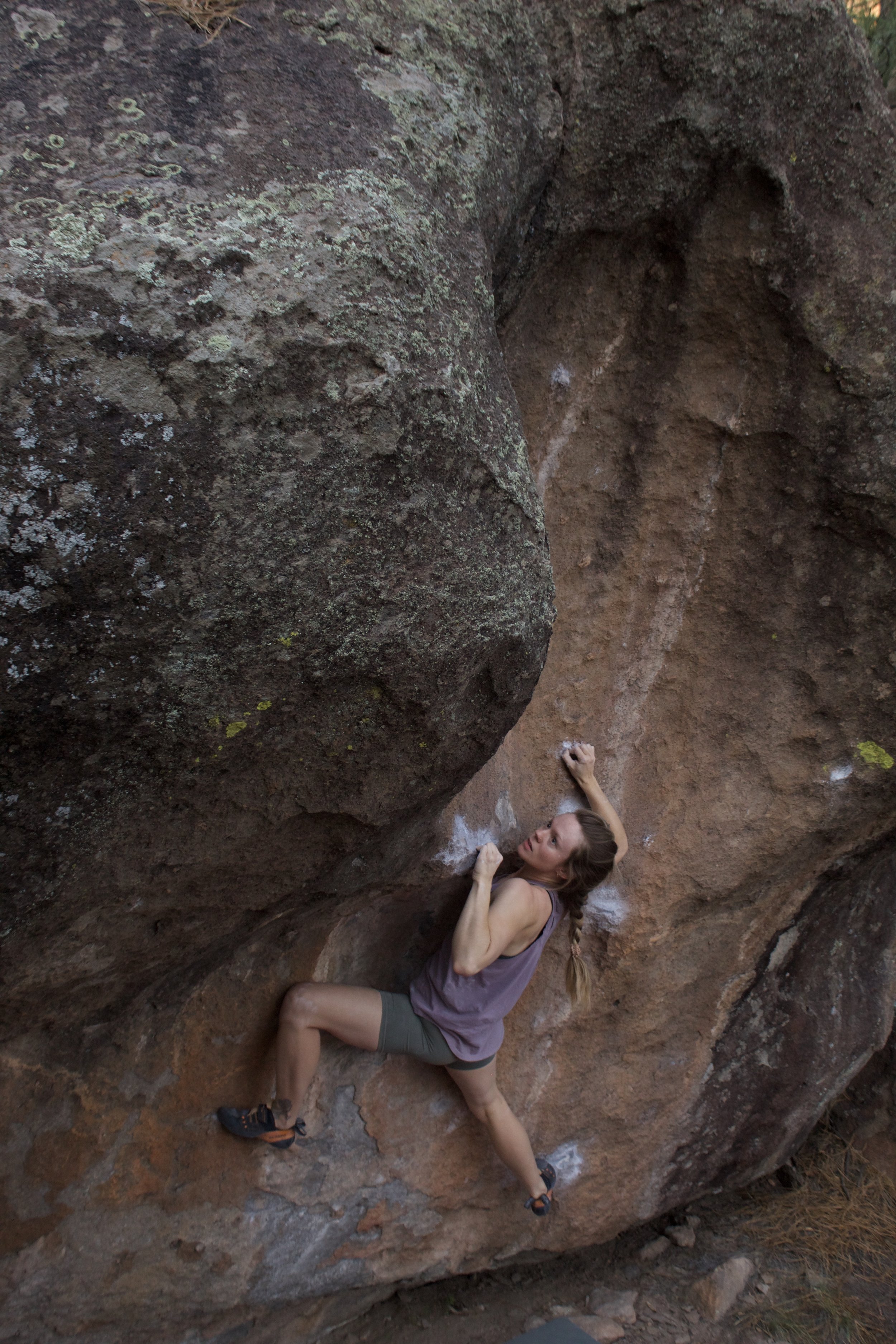
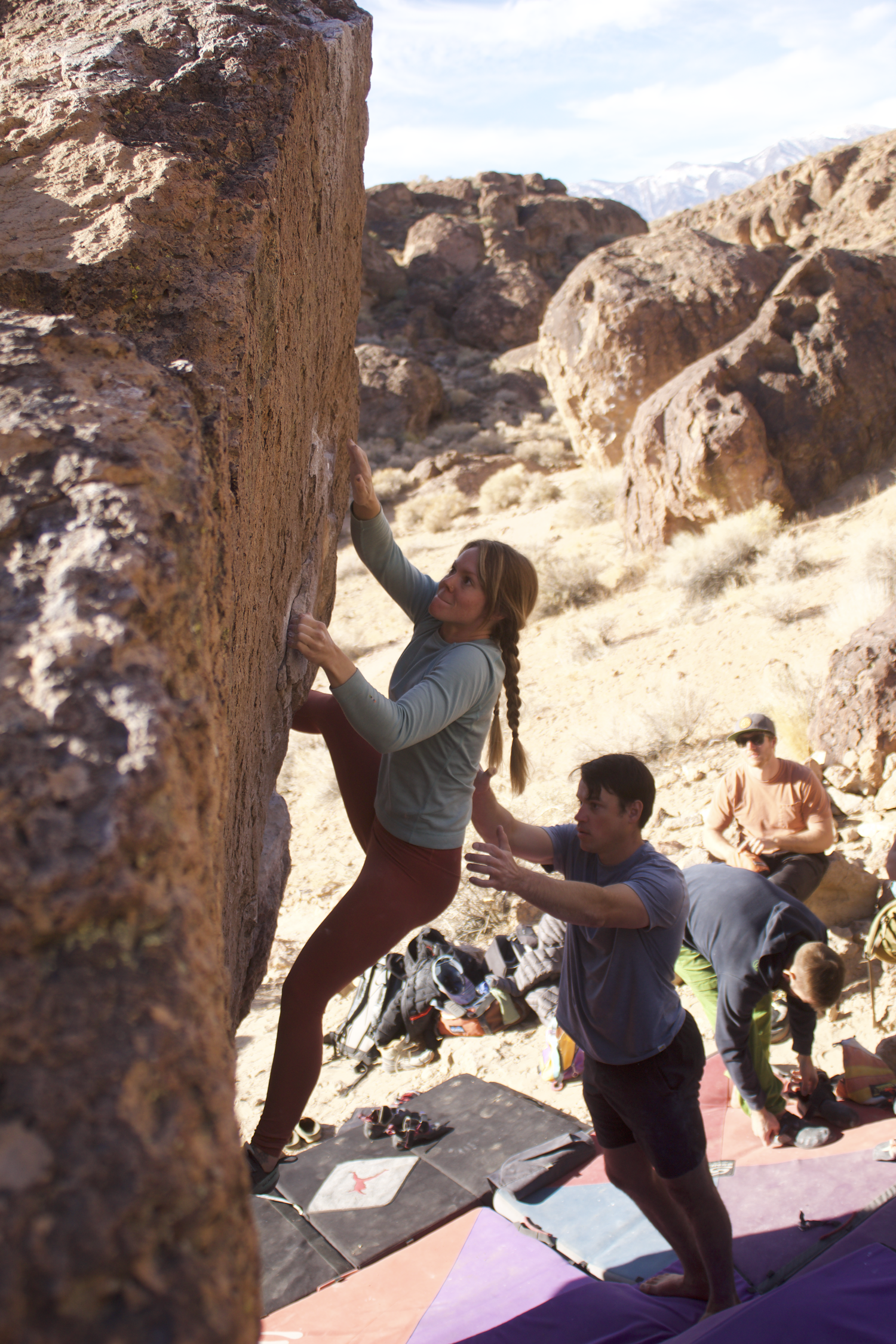
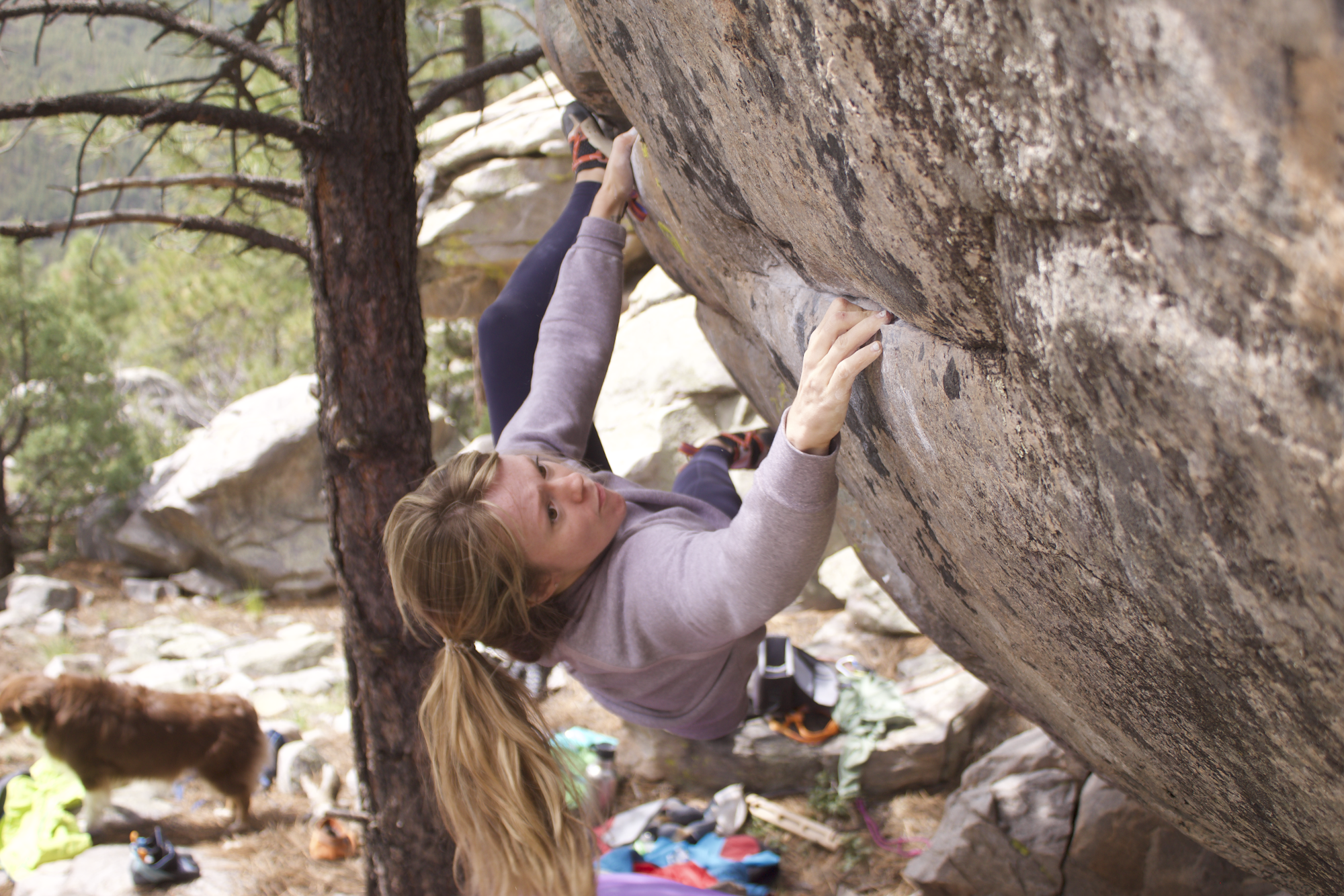


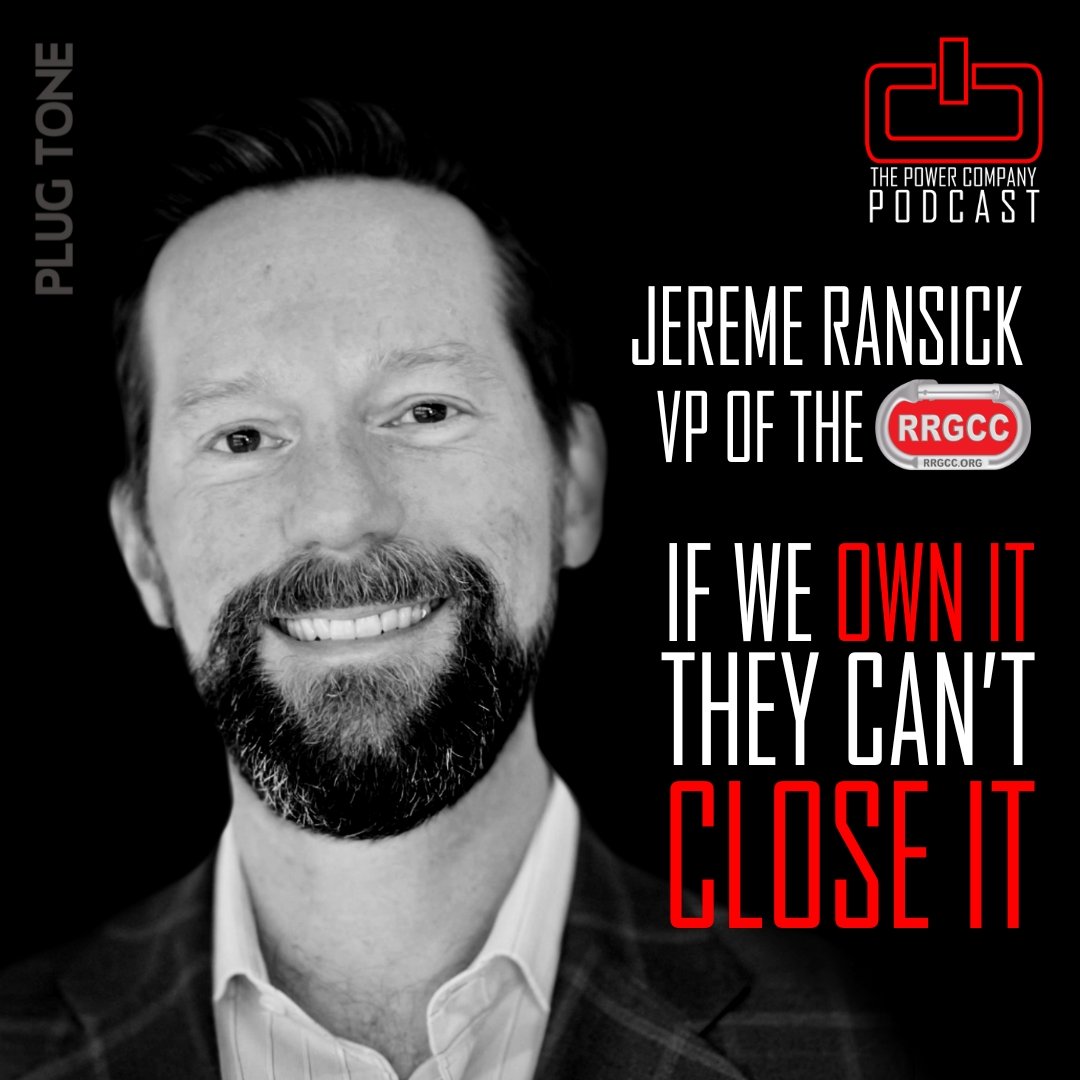





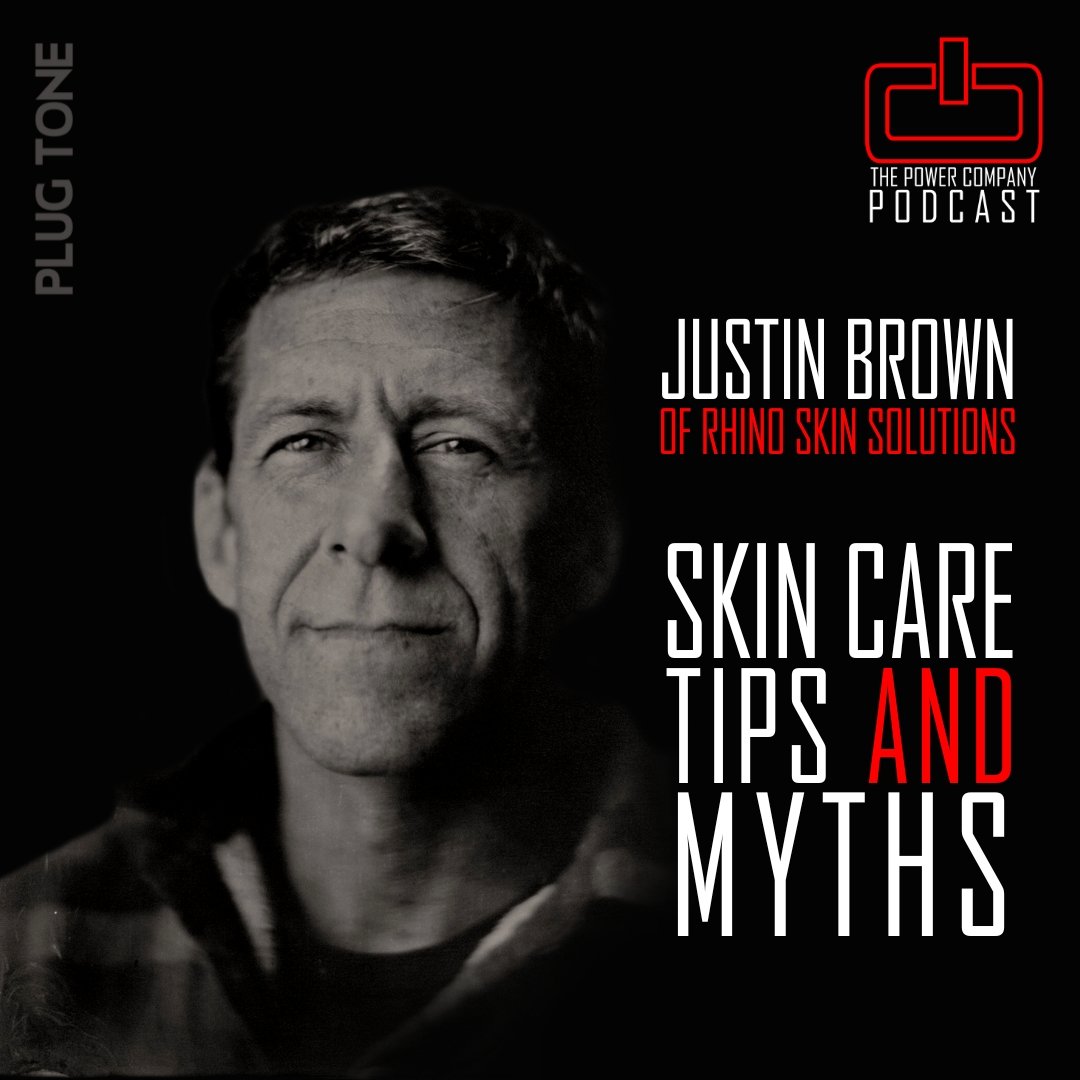
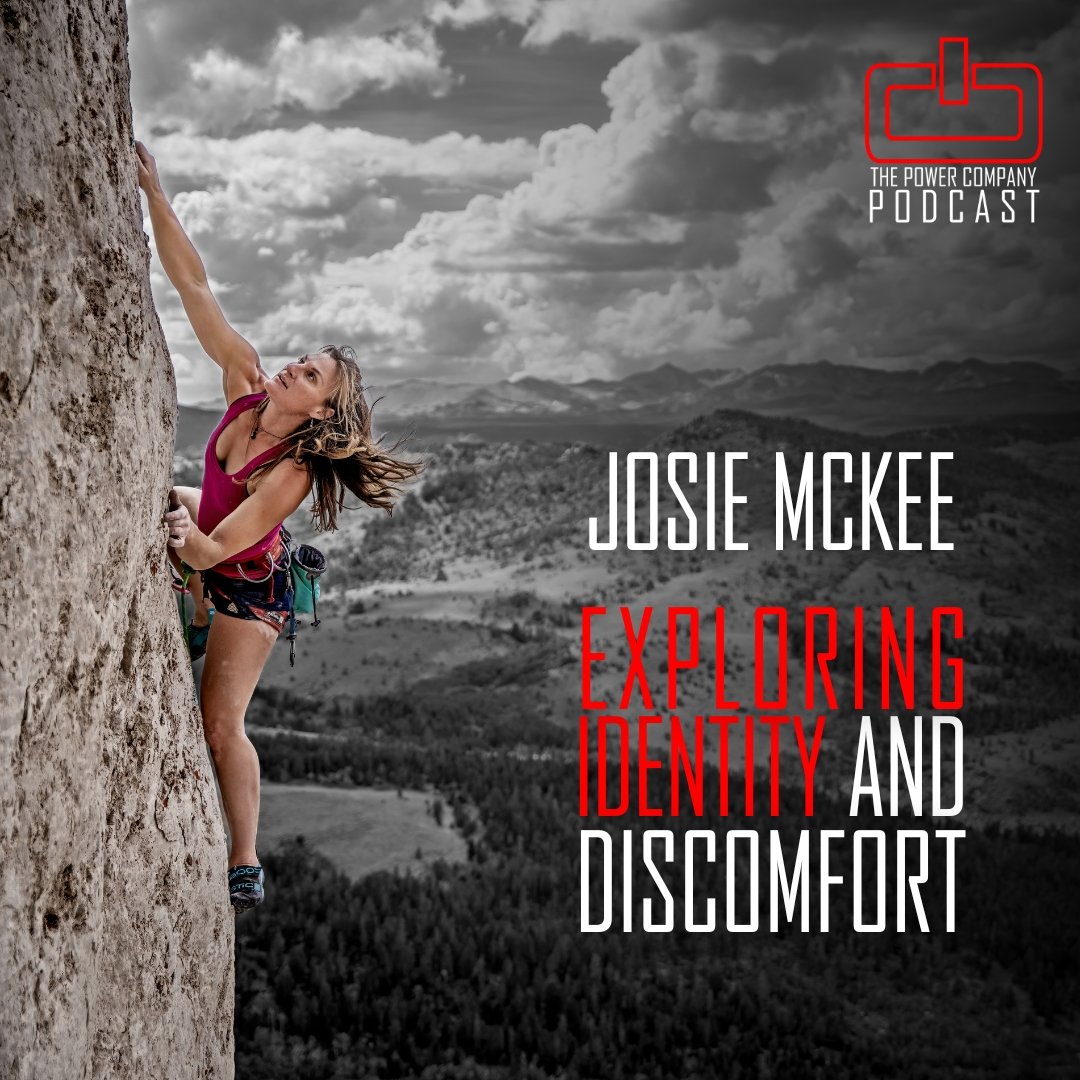


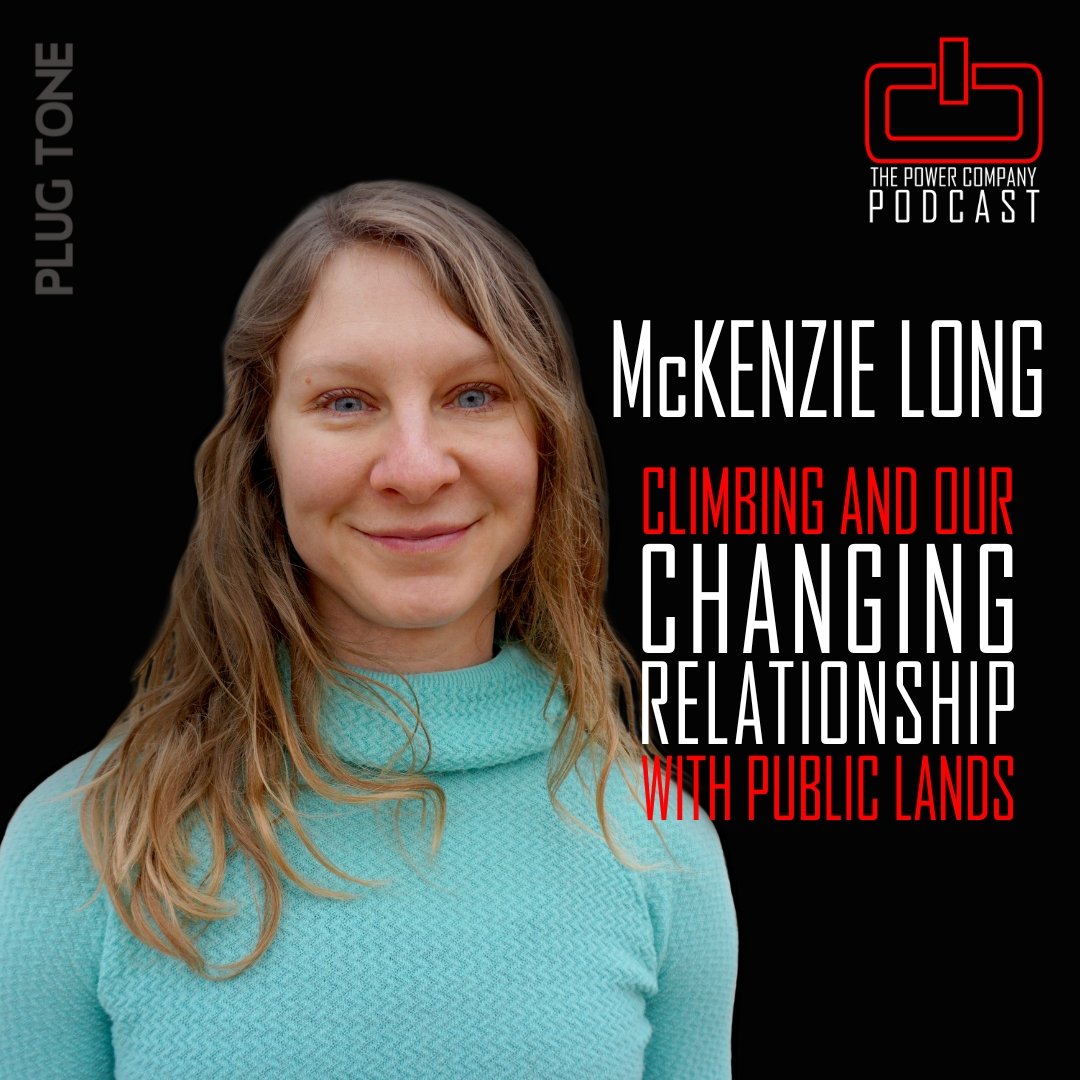
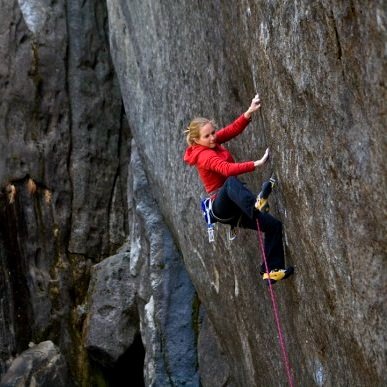
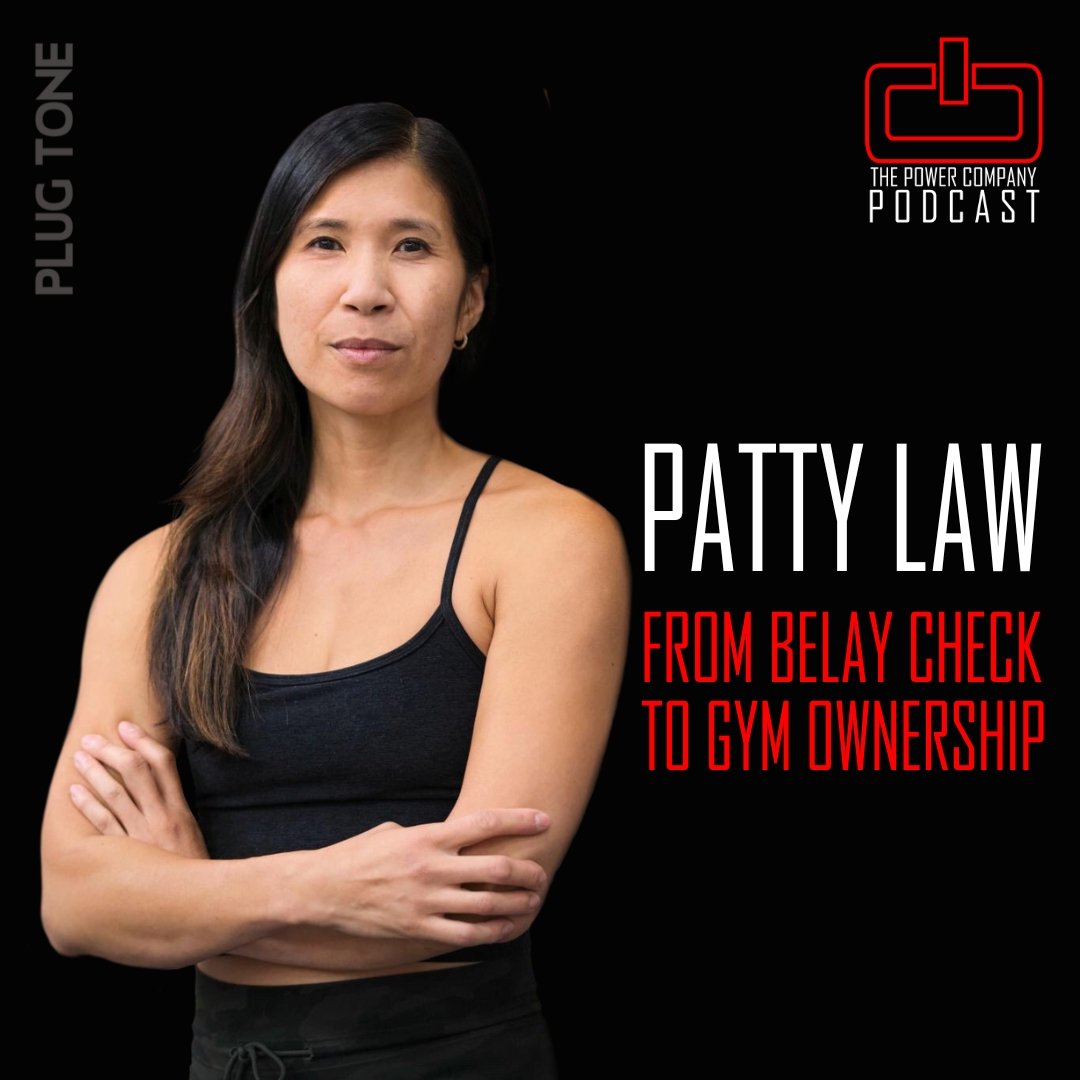


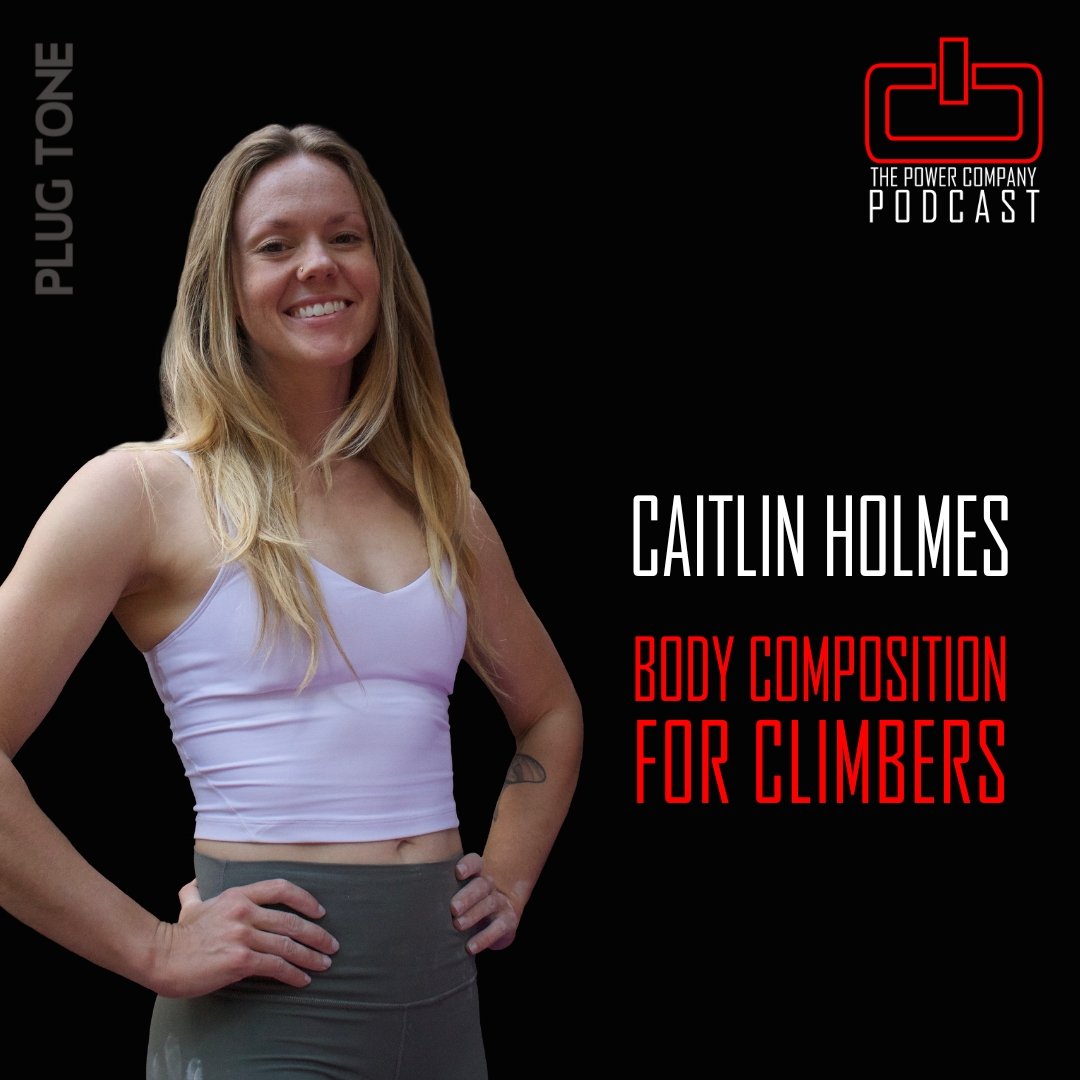
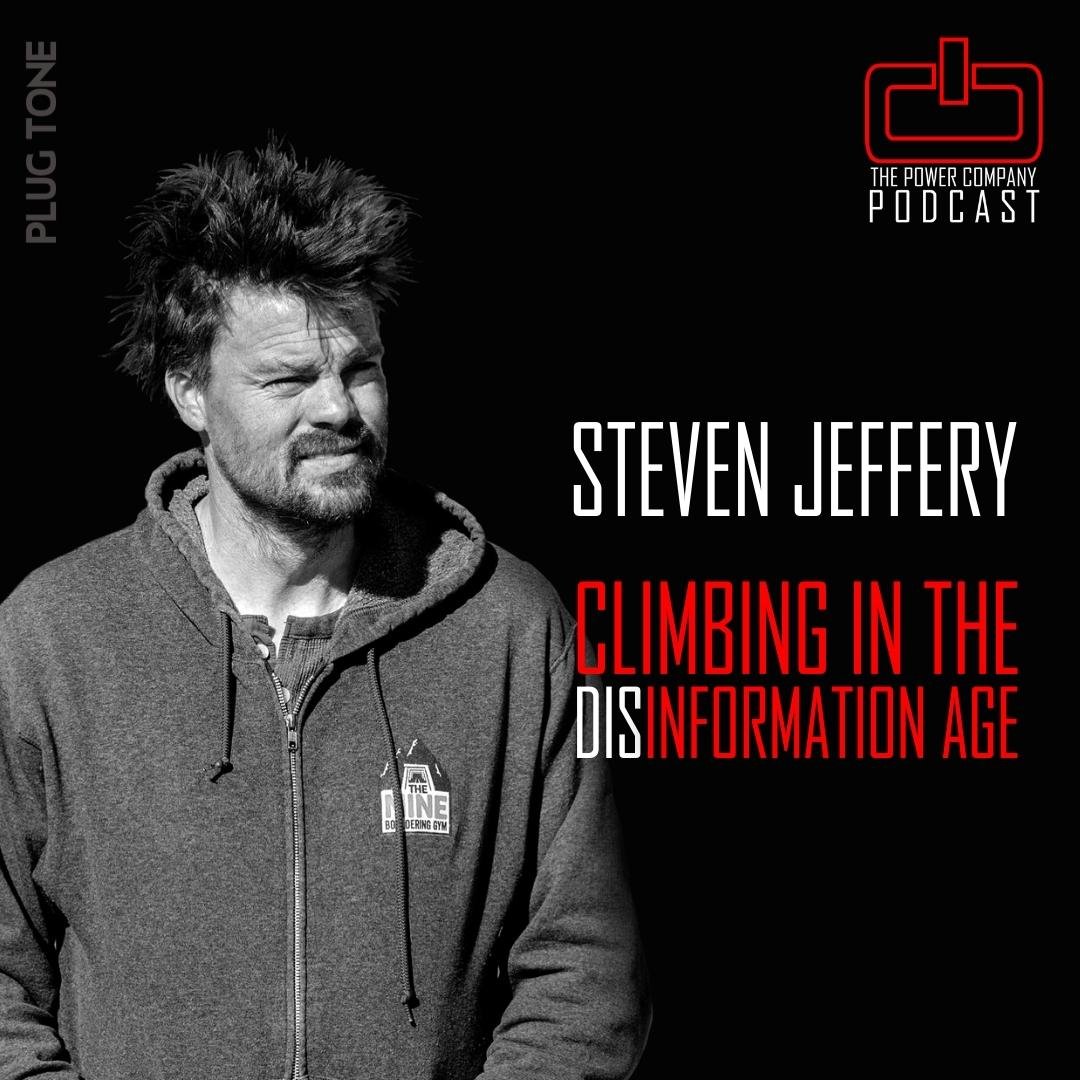





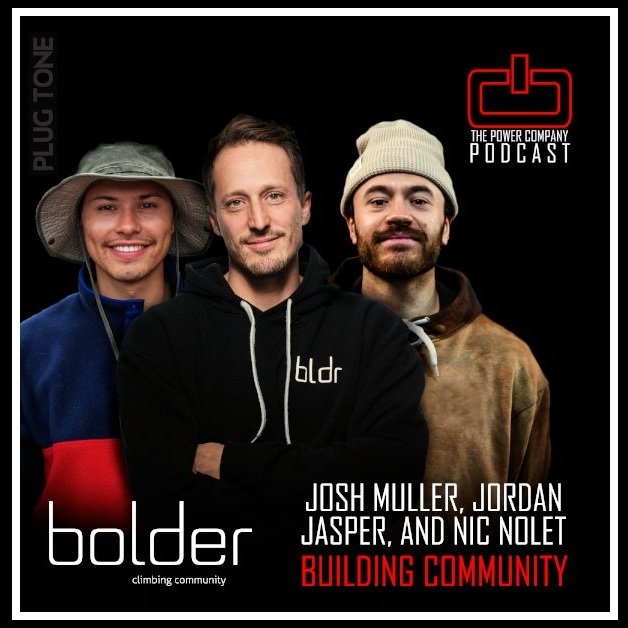

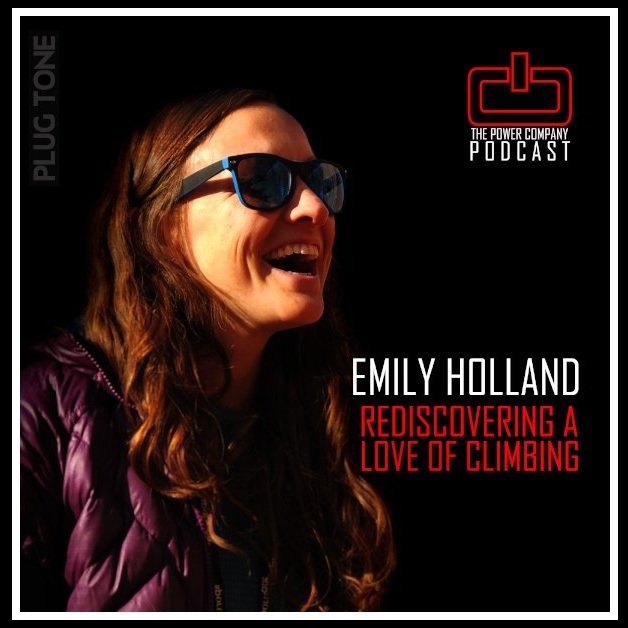




Today, we rewind to an episode with Hazel Findlay in which she shares strategies for getting into the right mindset to send.